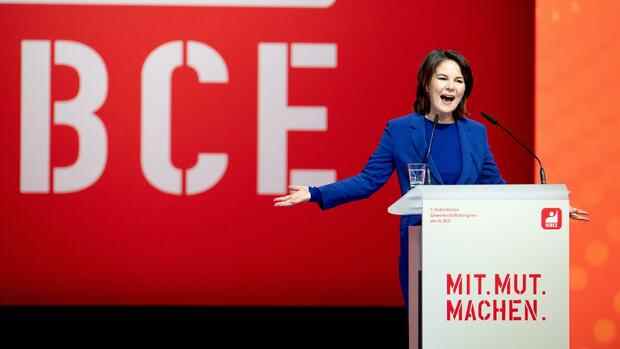Berlin As a coincidence, the Federal Congress of the Mining, Chemical and Energy Industrial Union (IG BCE), which meets every four years, takes place regularly shortly after a federal election. While SPD chancellor candidate Olaf Scholz, Green leader Annalena Baerbock and FDP leader Christian Lindner speak to the 400 delegates on Wednesday, deep coalition negotiations for a traffic light alliance are already starting in Berlin. And so there will be a display of the likely future government partners at the IG-BCE congress.
From the point of view of IG BCE, the challenges have not diminished in the past four years – on the contrary. The exit from coal and nuclear power, the rapidly tightened climate targets and the increased energy prices are putting pressure on their industries in particular. In their lead proposal, the delegates therefore call on the future federal government to socially cushion the ecological transformation. From the point of view of the union, top earners and the wealthy should also pay for this through higher taxes.
Scholz on raising the retirement age: “That will not happen with this government”
Scholz, whose party entered the election campaign with precisely this demand, circumvented the tax issue in Hanover and placed the issue of respect at the center of his short speech. “We have to ensure that work and employees play a bigger role again in our society.”
That is why he is happy that the minimum wage will now rise to twelve euros in one step. The retirement age should not be raised: “That will not happen with this government.”
Top jobs of the day
Find the best jobs now and
be notified by email.
The climate-neutral restructuring of industry – chemistry alone needs as much electricity around 2050 as Germany as a whole today – can only succeed if enough green electricity is available. The new government will therefore set the necessary course in the first year “so that Germany does not have an electricity shortage”.
Green leader Baerbock does not have a home game at the Hanover Congress Center, where she was elected party chairman four years ago. IG-BCE boss Michael Vassiliadis welcomes his union to keep asking uncomfortable questions – not to prevent the move towards climate neutrality, but to make it sensible and socially acceptable.
Baerbock, who talks more than twice as long as Scholz, draws the big bow: climate neutrality in Germany and Europe, system competition with China, core labor standards, better working conditions for nurses, changing lanes in the immigration law.
Most of all, however, the delegates are likely to be interested in their remarks on the energy transition. It was not for nothing that Vassiliadis had emphasized that the faster expansion of renewable energies was “a kind of life insurance for many of our industries”.
In the explorations, your party pushed through to reserve two percent of the country’s area for wind power and to provide new buildings with solar roofs, says Baerbock. Nevertheless, a “huge, joint effort” is required. The blockade on the expansion of renewables must finally be resolved – for the climate, for job security – and in order to be able to accelerate the phase-out of coal. Like Scholz, Baerbock also emphasizes that gas-fired power plants will be needed for the transition period. But every new system that is built must also be “hydrogen-ready”.
Neither Scholz nor the head of the Greens talk about financing the transformation, although a study by the BDI and the Boston Consulting Group put the financial requirements for implementing the climate protection measures adopted at 860 billion euros by 2030. The new government must create the conditions for investment, says Vassiliadis when welcoming the third guest, FDP leader Lindner. One could, for example, bring the taxation of wealth in Germany to OECD level or abolish the flat rate taxation of capital gains.
The SPD, FDP and the Greens have decided not to raise taxes, replies the Finance Minister, Lindner, who can be connected via video from Berlin. But one will certainly check the usefulness of some subsidies, such as the one for plug-in hybrids.
Lindner on planning acceleration: “More must be possible in Germany quickly”
And it is about – flanked by guarantees from the state development banks – to activate private capital for the transformation and to let it flow away through faster planning and approval processes. “It has to be possible more quickly in Germany,” says Lindner and promotes the liberal super-depreciation program for climate protection investments.
When it comes to restructuring the economy, it is important for the FDP to be open to technology: green and turquoise hydrogen, gas for the transition, renewable energies and synthetic fuels – everything should have its place.
In order for the SPD, Greens and FDP to tackle the transformation, the exploratory results must first be turned into a coalition agreement. A traffic light is unquestionably an alliance of partners “who have not looked for each other,” says Lindner. And in the beginning it might also be an alliance of convenience. But in the long term it has the chance to bring the social market economy up to date with a socio-ecological market economy.
More: The man for the realistic measure – How Michael Vassiliadis dims the climate plans of politics
